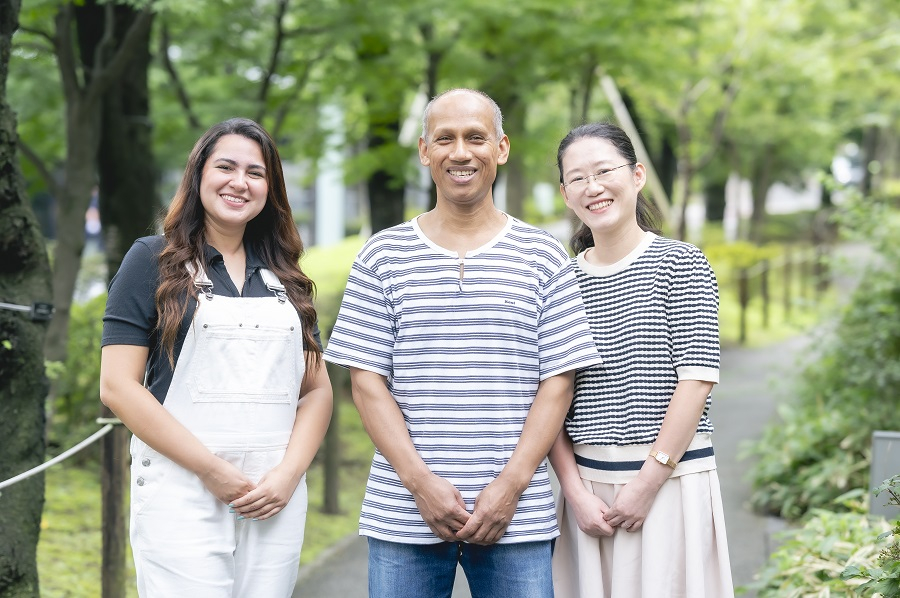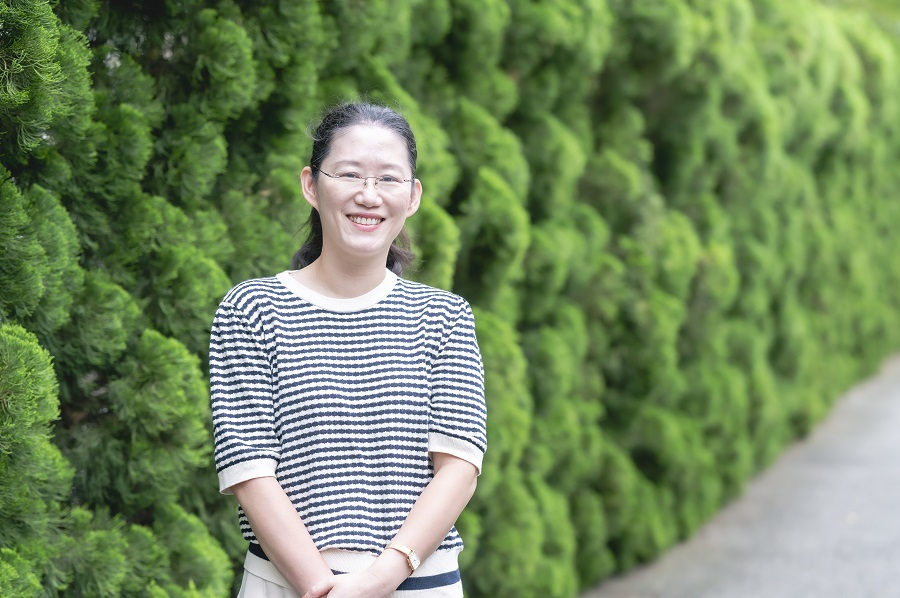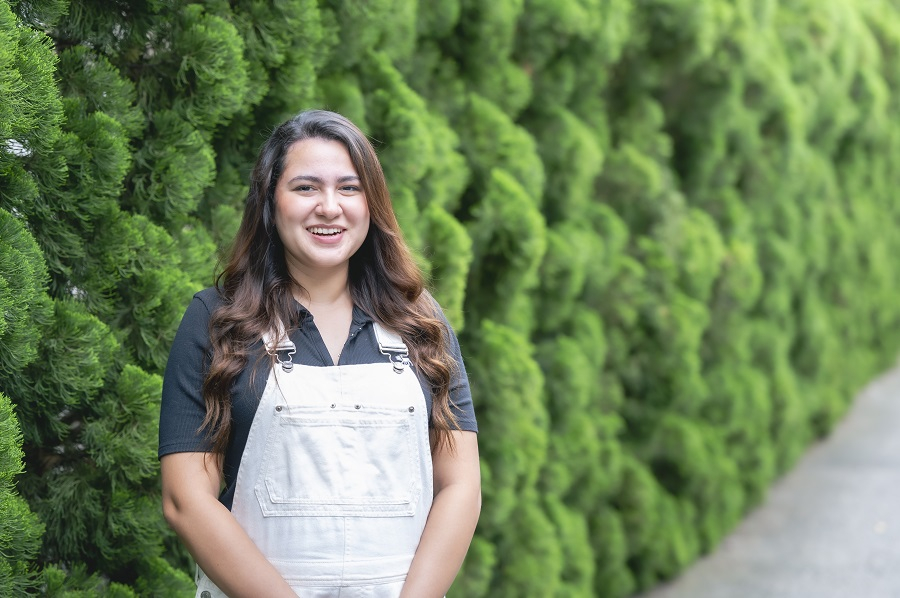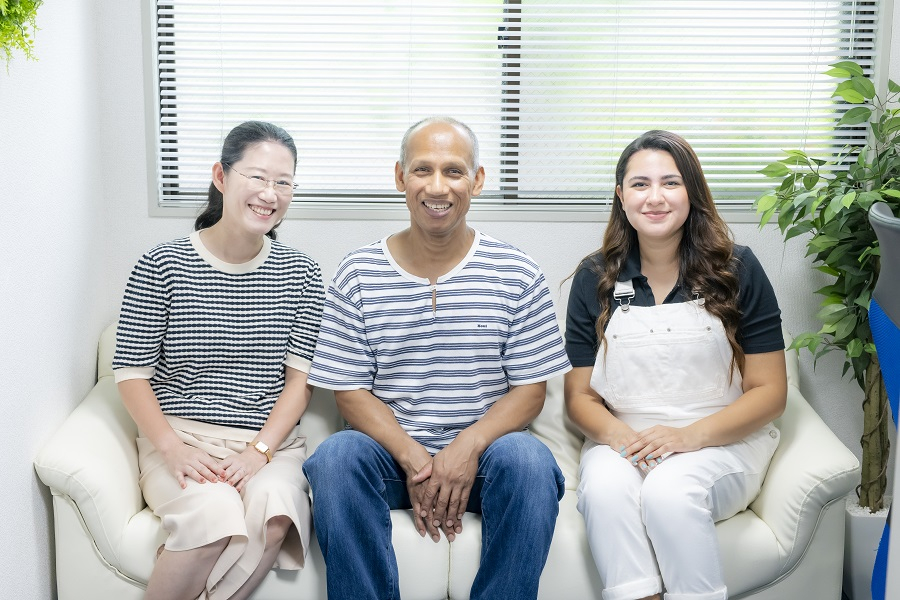Intercultural Crosstalk
About Community-based Japanese Language Classes and Support -the First Encounter with a Community-based Japanese Language Class-

Profiles
Aisha (from Japan)
- Years of residence in Japan
- 24 years (born and raised in Japan)
- Native language
- Japanese and Spanish (her parents are from Pakistan and Peru)
- Favorite Japanese words
- maji, sōnanda (really? Is that so!)
- Favorite places in Tokyo
- I don't have a favorite place in Tokyo.
- Favorite food
- Lomo saltado (a Peruvian dish with soy based beef, rice and potatoes)
- Hobbies
- Watching movies, training, karaoke, going to the beach
- Working in Japan
- Japanese language instructor at a prefectural high school
Sarwar (from Bangladesh)
- Years of residence in Japan
- 35 years
- Native language
- Bengali
- Favorite Japanese words
- gaman (patience, endurance)
- Favorite places in Tokyo
- Kasai Rinkai Park
- Favorite food
- Nattō (fermented soy beans), yakitori (chicken skewers)
- Hobbies
- Learning
- Working in own country
- Farming
Yan (from China)
- Years of residence in Japan
- 14 years
- Native language
- Chinese
- Favorite Japanese words
- Gochisosama-deshita (phrase used after a meal to thank for a wonderful meal)
- Favorite places in Tokyo
- Komazawa Park
- Favorite food
- Meat
- Hobbies
- Traveling
- Working in own country
- Company employee
Round 1: The First Encounter with a Community-based Japanese Language Class
Over the next 3 months, from this month until November, we will be bringing you a 3-part series of roundtable discussions on the topic of “Community-based Japanese Language Classes and Support”. The 3 participants in this discussion have experience of attending community Japanese language classes or Japanese language classes at school. In the first round, they talked about their first encounter with a community-based Japanese language class.
How Did You Find the Japanese Language Classes?

I came to Japan after getting married in China. At first, I lived in Yamato City, Kanagawa Prefecture, with my husband's family. At the time, I didn't understand any Japanese at all, so I enrolled in a Japanese language school. After attending for about 6 months, I moved to Setagaya Ward and had to quit, and then I found online, a Japanese language class in my area. It was about 10 years ago, but at the time it wasn't as convenient as it is now, so I looked it up on the computer and found it.
I came to Japan in around 1988. I couldn't speak any Japanese at all. At the time, I feel that there weren't many places where you could study Japanese from a volunteer teacher. I would go out looking for Japanese language classes in the town 4 to 5 times a week.
I attended Japanese language classes in a class within the school, when everyone else was having other lessons. The Japanese teacher came from elsewhere to teach us.
Was it like an international class(kokusai-kyoshitsu)?
There was an international class and a separate Japanese language class. As it was in the school, I think the Japanese language class was once a week and the international class was about three times a week. When everyone else was taking their regular classes, I would study one-on-one with the teacher at a slower pace. The teacher for the international class would change, but the Japanese language teacher was the same throughout.
About the Reasons and Circumstances That Led You to Start Attending Japanese Language Classes

I attended the class that was closest to my house. There was only that one Japanese class in the area where I lived.
When I went to the area around the station to do some shopping after work, I saw a Japanese person handing out leaflets for a Japanese language class, saying "How about studying together?", I didn't understand Japanese, but there was also English written on the leaflet, so I said "I'd like to join". That was in 1993, and it was my first time joining a Japanese language class.
When I was in the 1st grade of elementary school, my teacher told me to go to the Japanese language class, so I started going. For a long time, I had been speaking Japanese with my father, who was from Pakistan, so I could speak Japanese at the time, but I enjoyed going to the class, so I continued going and was taught by the same teacher for 9 years until I was in the 3rd year of junior high school.
Even though you speak Japanese well, you were told to go to a Japanese class?
I didn't really need it, but I think it would have been good if they had checked my Japanese when I started elementary school. But it was fun and I learned a lot.
My son also had to take the international class, but when he was in about the 4th grade, he was told that he didn't need to go anymore. But there are children from many different countries, so it's fun.
There are many children of foreign origin who can't keep up with the schoolwork.
My mother also wanted me to do this, so when I was in 4th or 5th grade, I tried to go back to the regular class, but I couldn't understand the Japanese language and literature lessons. In the international class, Japanese language and literature was a separate class. I thought that I wouldn't be able to keep up with the regular class because the academic subjects were taught more slowly in the international class.
What Was your Impression of the Language Class?

There were a lot of young people at the Japanese language school. We studied from textbooks and the pace of the lessons was fast. I didn't understand any Japanese at all, so it was very difficult. I attended for 6 months, but then I moved house, so I stopped going to the Japanese language school and started going to a local Japanese language class instead.
The atmosphere at the Japanese language class was really good. It was a Saturday class, so there were a lot of office workers. There were also foreign students and diplomats. The teachers taught us lots of things.
When I first went to the classes in 1993, I was so nervous because I couldn't speak Japanese. I didn't know what the teacher was saying or how to communicate with them. At the time, I also couldn't speak English very well, so it was really hard. I studied from hiragana, and even when I got home I would write and stick the characters in various places. In the bathroom, in the bath, etc. When it was one-on-one practice time, I couldn't do it, so the other person wouldn’t progress either. I studied very hard in groups of 3 or 4 people from China and Korea, and we tried to be creative. I asked the other people in the group to explain things to me, like kanji.
What motivated you to work hard at learning Japanese?
It's boring to work in a company and not be able to talk to anyone. I didn't want to be in a situation where I didn't understand what people were saying, so I thought I had to learn Japanese in order to get used to Japan.
I understand that very well, because I also started learning Japanese from scratch.
If you can't speak Japanese, you go home after work stressed out. It's a cycle. The Japanese classes I attended once a week weren't enough, so I went to classes in Shibuya after work, and I went to various classes 4 to 5 times a week. I worked really hard, because I wanted to speak Japanese.
How Were You Studying?

I took the textbook "Minna no Nihongo" that I used at the Japanese language school with me. The teacher asked me what I wanted to study first, so I liked the fact that I could learn at my own pace. The teacher changes every 6 months, so the teaching style differs depending on the teacher. I've never had a teacher I didn't get on with. Everyone was kind. I went for 4 or 5 years, but then I moved again and had to quit. I still keep in touch with my teacher, and sometimes we have lunch together. I became friends with my teacher.
There were textbooks for the Japanese language classes, but at the teacher's recommendation I went to Kinokuniya book store in Shinjuku and bought some books for myself. That was the start of a whole new world for me. I started going to a local Japanese language class in 1993, and in 1998 the Katsushika Ward Office started a training course for Japanese language volunteers to help them set up their own Japanese language classes. I started going to that course too. That's where I met my wife. This was around the time when I had already made a lot of progress with my Japanese. At that time, I wasn't teaching yet, but was still learning as an advanced student. After our lessons, we would all go out for dinner or to karaoke. These kinds of interactions may have been the key to my progress.
We sometimes had lunch with the other students at my classroom, but we never went to karaoke. There were a lot of businessmen, so it might have been difficult.
Unlike the 2 of you, I was a child, so we would all cook food from different countries together. Anyway, I really enjoyed the Japanese language classes, and I only went to the Japanese language classes and not the international classes. I had the same teacher from 1st grade all the way through to 3rd year of junior high school, and because she taught in a fun way, I wanted to go back. The distance between the teacher and the students was also close, and we got on well.
My mother also attended Japanese language classes. This was because most of her work was with people from South America, so she was in an environment where she used a minimum amount of Japanese, and mostly spoke Spanish.
I have been attending the Asian Exchange Association (Asia no Kai) since 1993, and I still go there today. I have taken the Japanese language volunteer training course twice, and now I go there as a volunteer teacher. I try to teach Japanese to people from China, Pakistan, Bangladesh and America in Japanese.
The 3 of them say that they are very grateful to the teachers who taught them Japanese at the Japanese language classes. They say that at the Japanese language classes, they were able to ask questions about not only Japanese but also cultural differences and other things they didn't understand in their daily lives. Next time, they will talk about “the place called the Community-based Japanese Language Class”.
── Continued in the Following Issues
